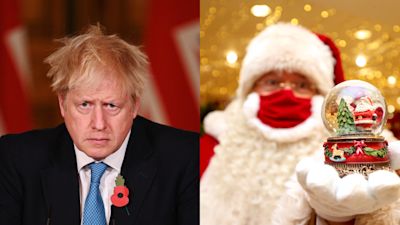Covid: England enters month-long lockdown as people told to 'stay at home'

Video report by ITV News Political Correspondent Romilly Weeks
England has entered a full national lockdown and will remain under tight coronavirus restrictions for at least the next month.
It means more than 55 million people are again being told to work from home and only go outside for essential reasons.
Boris Johnson is hoping the strict lockdown will bring the infection rate of Covid-19 down far enough that he can reopen the economy ahead of Christmas.
The prime minister said he was forced to implement the lockdown to avoid the NHS becoming overwhelmed, which he said could result in thousands of deaths a day.
Watch the full Covid briefing here:
As with the first lockdown, all non-essential shops, hospitality, leisure and entertainment venues have closed.
All indoor cross-household socialising is banned and people can only meet outdoors with a maximum of one person from another household.
People should only go outdoors for work - if they cannot work from home - education, exercise, recreation, all medical reasons, appointments and to escape injury or harm.
People are also allowed to provide care for vulnerable people and shop for essentials.
Schools and nurseries are open and parents are advised that children should continue attending, due to evidence that youngsters are low risk.
Colleges and universities are also staying open, however many may convert to virtual learning to keep down social contacts.
MPs in the House of Commons overwhelmingly accepted the proposals for a new lockdown, but the PM was dealt a blow by several furious Tory MPs who refused to back the motion.
He won the vote by a significant majority - 516 votes to 38 - but several senior Tories, including the chair of the Conservative backbench 1922 Committee, Sir Graham Brady, voted to reject the lockdown.
Some 34 Tories voted against the motion.
Other senior Tory MPs to oppose the government were former leader Sir Iain Duncan Smith, former chief whip Mark Harper, former minister Tim Loughton and Sir Charles Walker.
Many had been furious about the financial impact of lockdown - including former Prime Minister Theresa May who abstained from the vote - and others had issue with the possibility of it being extended.
But the PM has insisted restrictions will end when planned, telling the Confederation of British Industry conference: "Believe me, we will end these autumn measures on December 2, when they expire."
If Mr Johnson tries to extend the restrictions past December 2, he could have another, even bigger rebellion on his hands when MPs are asked to vote on the next steps.
Justice Secretary Robert Buckland, when asked if he believed this lockdown would have to be the last, said: "I don't think any of us can rule out or rule in what might happen later in the winter."
He said MPs will be "looking carefully at the emerging information over the next month" and they should be "persuaded on the basis of the information we receive."
He added: "I believe that [England's lockdown] will help to make a significant difference but none of us can fully see into the future which is why we can rule nothing out."
Listen to the ITV News politics podcast: